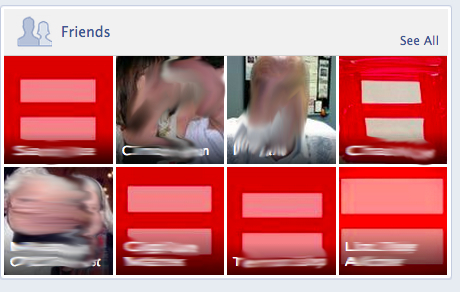
You have no doubt seen the Human Rights Campaign's new red and pink equal sign avatar that is sweeping through Facebook this week as well as pictures and status updates affirming support for same-sex marriage. But what does it all mean? Why does it matter?
Social media can be petty and frivolous; it can be a drain on time and fuel jealousy. But, when it comes to politics, social media serves as a powerful echo-chamber that can shape views on candidates and issues alike. In this sense, it is not much different from conversations with friends, family and co-workers around the dinner table or the office water cooler. When a Facebook user sees his or her news feed is filled with pronouncements of support for same-sex marriage, that may lead to one of the following outcomes:
1) A user who already supports same-sex marriage may be inspired to adopt an equal sign avatar or share a supportive image or status update. This leads to a chain reaction -- everyone's doing it and no one who supports gay marriage wants to be mistaken for an opponent or a hater.
2) A user who is undecided or opposed to same-sex marriage may be led to reevaluate his or her beliefs. Seeing that one's grandchildren, fellow churchgoers, or respected friends from college visibly support gay marriage can cause people to think something along the lines of, "These people whom I love, trust and admire support gay marriage. I should too."

Companies value Facebook because when users like something on the site -- be it a hotel, a website, a book or a type of soda -- their Facebook friends can see this, making likes tantamount to word of mouth endorsements. A Nielsen poll of 25,000 internet consumers showed that 90 percent of respondents said that they "completely" or "somewhat" trusted recommendations from friends or acquaintances. This is much higher than those who trusted TV ads (62 percent), newspaper ads (59 percent), e-mails (54 percent), and online banner ads (33 percent). On Facebook, issues like same-sex marriage and political candidates are similar to products and brands. Changing one's profile picture to the pink and red equal sign or posting messages supporting gay marriage is tantamount to a word of mouth endorsement.
The Pew Internet & American Life Project found that 38 percent of social networking service users "have discovered through a friend's posts that his/her political beliefs were different than the user thought they were" and that 16 percent "say they have changed their views about a political issue after discussing or reading posts about" on social networks. Facebook affords us the ability to learn what our friends think about the issues of the day, views that may not come out in the course of ordinary in-person conversation. But, more importantly, what we learn on Facebook can cause us to reexamine and change our own views and lead to social change in our country. The equal sign on Facebook is not just a statement of solidarity -- it can shape the views of others and change our political discourse.